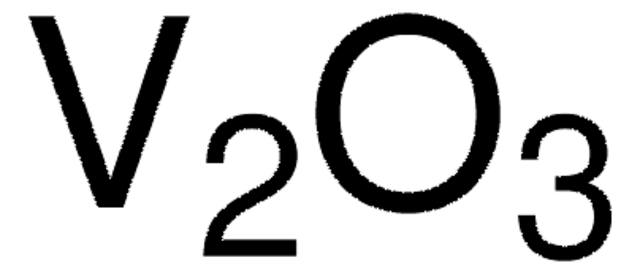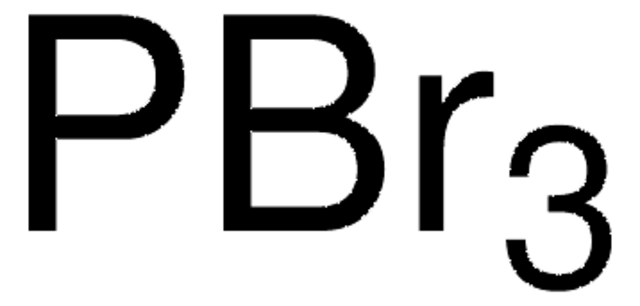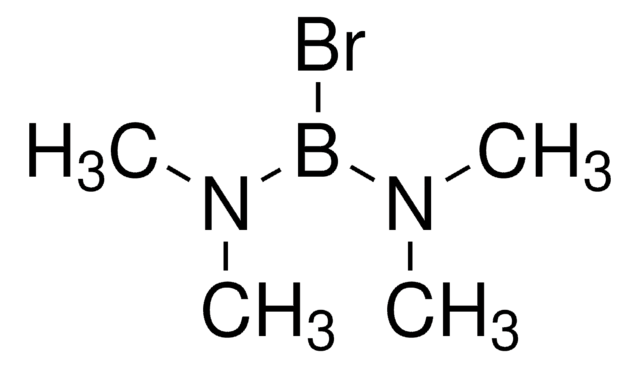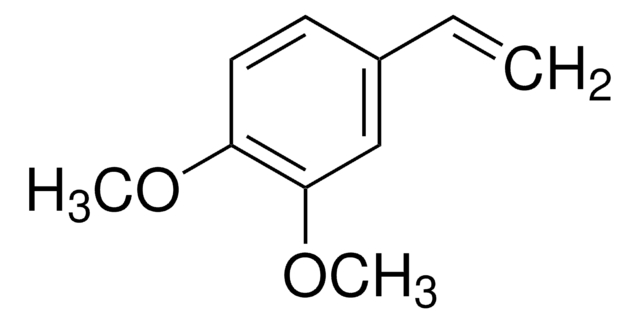230367
Boron tribromide
≥99.99%
Synonym(s):
Tribromoboron
Sign Into View Organizational & Contract Pricing
All Photos(1)
About This Item
Empirical Formula (Hill Notation):
BBr3
CAS Number:
Molecular Weight:
250.52
EC Number:
MDL number:
UNSPSC Code:
12352101
PubChem Substance ID:
NACRES:
NA.22
Recommended Products
vapor density
8.6 (vs air)
Quality Level
vapor pressure
40 mmHg ( 14 °C)
Assay
≥99.99%
form
liquid
bp
~90 °C (lit.)
mp
−46 °C (lit.)
density
2.60 g/mL at 20 °C (lit.)
SMILES string
BrB(Br)Br
InChI
1S/BBr3/c2-1(3)4
InChI key
ILAHWRKJUDSMFH-UHFFFAOYSA-N
Looking for similar products? Visit Product Comparison Guide
General description
Boron tribromide (BBr3) is a strong Lewis acid generally used as a reagent for the deprotection of ethers. Alkyl aryl ethers are cleaved at the alkyl-oxygen bond to give ArOH and alkyl bromides. In a particular case, BBr3 was used to cleave acetals that could not be deprotected under standard acidic conditions. Similarly, amino acid-protecting groups such as benzyloxycarbonyl and tert-butoxycarbonyl groups can be deprotected by BBr3. It can also be used to deprotect carbohydrate derivatives and polyoxygenated intermediates in the preparation of deoxyvernolepin, vernolepin, and vernomenin.
Application
Reactant for preparation of:
- Drug intermediate 6-nitro-L-DOPA
- Luminescent polystyrene derivatives with sterically protected carbazolylborane moieties
- High-quality boron-doped graphene via Wurtz-type reductive coupling reaction
- Mercapto-(+)-methamphetamine haptens for synthesis of (+)-methamphetamine conjugate vaccines with improved epitope densities
- Micrometer-sized organic molecule-DNA hybrid structures
- Borane complexes via electrophilic aromatic borylation reactions
- A 5-HT2C receptor agonist
- Biphenyl-derivatives possessing tertiary amino groups as β-secretase(BACE1) inhibitors for the treatment of Alzheimer′s disease
- A highly near-IR region fluorescent p-extended boron aza-dipyrromethene moiety unit
- Tetrahydroisoquinoline derivatives via intramolecular cyclization of methoxy-substituted N-phenethylimides
With alkynes forms 2-alkenyldibromoboranes, which show reversed regiochemistry in Diels-Alder reactions as compared to BBN. Intermediates generated from 1-alkynes couple to alkyl halides providing trisubstituted alkenes. Reacts with chiral sulfonamides to provide precursors of chiral glycidol esters, acetate diols, β-hydroxy esters, and amino acid esters. Useful for the synthesis of precursors to group 13-15 semiconductor materials.
accessory
Product No.
Description
Pricing
Signal Word
Danger
Hazard Statements
Precautionary Statements
Hazard Classifications
Acute Tox. 2 Inhalation - Acute Tox. 2 Oral - Eye Dam. 1 - Skin Corr. 1A
Storage Class Code
6.1B - Non-combustible acute toxic Cat. 1 and 2 / very toxic hazardous materials
WGK
WGK 3
Personal Protective Equipment
dust mask type N95 (US), Eyeshields, Gloves
Choose from one of the most recent versions:
Already Own This Product?
Find documentation for the products that you have recently purchased in the Document Library.
Customers Also Viewed
Michael S. Lube et al.
Inorganic chemistry, 35(17), 5007-5014 (1996-08-14)
The 1:1 mole ratio reactions of boron trihalides (BX(3)) with tris(trimethylsilyl)phosphine [P(SiMe(3))(3)] produced 1:1 Lewis acid/base adducts [X(3)B.P(SiMe(3))(3), X = Cl (1), Br (2), I (5)]. Analogous 1:1 mole ratio reactions of these boron trihalides with lithium bis(trimethylsilyl)phosphide [LiP(SiMe(3))(2)] produced
Tetrahedron Letters, 29, 1811-1811 (1988)
Tetrahedron Letters, 34, 3071-3071 (1993)
Tetrahedron Letters, 32, 2857-2857 (1991)
Boron Tribromide
Suzuki A, et al.
Encyclopedia of Reagents for Organic Synthesis, Second Edition, 2015(34), 7460-7467 (2001)
Our team of scientists has experience in all areas of research including Life Science, Material Science, Chemical Synthesis, Chromatography, Analytical and many others.
Contact Technical Service









